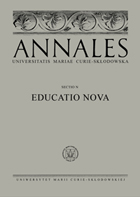Dzieci „toksycznych rodziców”.
Próba interpretacji „Niepocieszonego” Kazuo Ishiguro
Children of “Toxic Parents”: An Attempt of Interpretation of “The Unconsoled” by Kazuo Ishiguro
Author(s): Barbara MyrdzikSubject(s): Social Sciences, Sociology, Studies in violence and power, Family and social welfare
Published by: Wydawnictwo Naukowe Uniwersytetu Marii Curie-Sklodowskiej
Keywords: memory; labyrinth; toxic parents; narcissism; cultural crisis
Summary/Abstract: The article constitutes an attempt to interpret the novel by Kazuo Ishiguro The Unconsoled – a work with a complex plot and a multi-threaded structure, typical for a composition stretched on the frame of the rhizome-like labyrinth and the motif of memory imperfections. The labyrinth is a space of strangeness, of being lost. It is a journey of the main character who wanders around various spaces of the city and hotel (which performs a variety of functions), meets many random people and listens to their accounts. The life problems of the city’s inhabitants indicate the eternal truth, according to which a man cannot live without understanding, without talking to someone kind who has the ability to listen. They were looking for someone who would listen and understand them, someone who would kindly respond to their problems. It may also be assumed that living in a world without the feeling of a lack of transcendence, the inhabitants were looking for an authority like a messiah who would indicate the direction of renewal in the world of chaos and who would answer the question: How to live? The novel describes a cultural crisis triggered by the feeling of a fundamental contradiction between the world of scientific truths and the inner world of every human being. Values such as faith, friendship, selflessness, truthfulness or family, to which Ishiguro pays a lot of attention, have been lost. “Toxic parents” are shown in multiple configurations: on the example of Ryder’s parents, or Ryder himself as the father of Boris and Stephan Hoffman. The author shows one of the major causes of the paternity crisis, namely the cult of professional success. Professional success and rivalry connected with it completely absorb Ryder’s life and activities. As a result of the pursuit of professional fulfillment, the role of emotional ties in his life becomes less significant, they almost disappear. It may be assumed that, using the example of the crisis in the described city, Ishiguro presents the contemporary world, which lost the sense of life; however, he did not limit it to the lost past. The world in which all attempts to search for a new form of expression and valorization end in failure. It is a labyrinthine, objectified world which is only given outside, a world of showing off and a “game” of pretending, without honesty and simplicity. It is a place dominated by a pose and culture of narcissism, full of inauthenticity, artificiality and appearance. In addition, The Unconsoled is a poignant novel about human loneliness.
Journal: Annales UMCS Sectio N Educatio Nova
- Issue Year: 6/2021
- Issue No: 1
- Page Range: 281-301
- Page Count: 21
- Language: Polish

